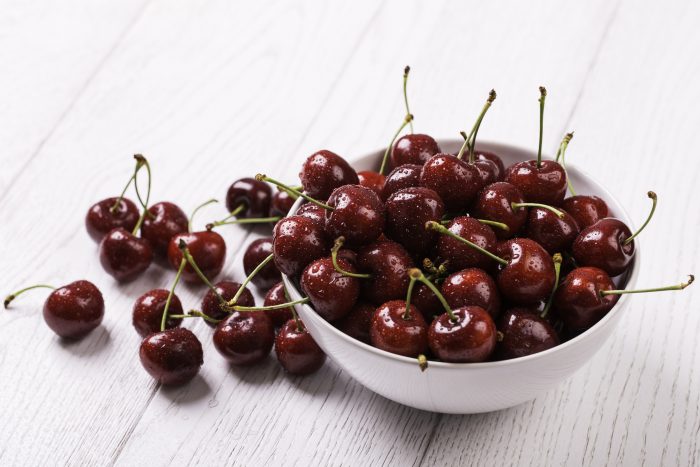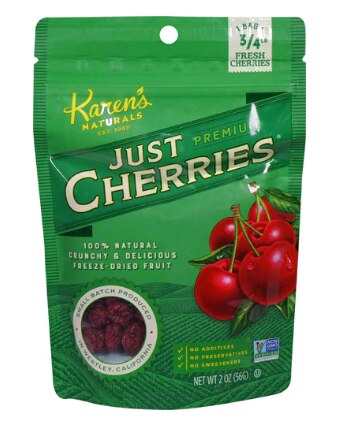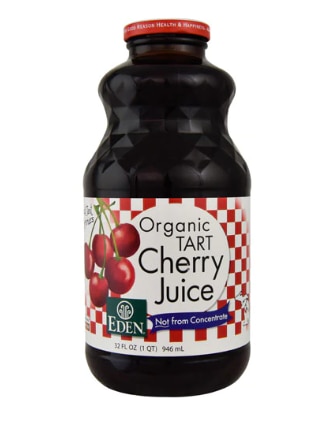The sun is high and you’re enjoying the day, but the real cherry on top is that big bowl of fresh, in-season cherries you brought for you and your friends to snack on. We know they’re delicious, but why are cherries so refreshing? As it turns out, these juicy summer staples are a superfood in disguise. Here. we’ll talk about the remarkable health benefits of eating cherries, plus a few ways you can incorporate them into your routine (whether they’re in season or not!).
Get to know cherries
Similar to some of our other summer produce favorites, cherry season starts in May and continues until August. The long growing season is partly due to the fact that there are hundreds of varieties of cherries, all of which can be grouped into two major types: sweet (Prunus avium L.) and tart (Prunus cerasus L.). In the U.S., the most commonly grown sweet cherry is Bing and most commonly grown tart cherry is Montmorency. Regardless of the variety you’ve chosen, this nutrient-dense fruit is:
- Low in calories (1 cup of cherries contains less than 100 calories)
- Fat free, sodium free and cholesterol free
- High in fiber, vitamin E and potassium
- An excellent source of vitamin C (1 serving delivers 15% of the recommended daily intake)
- Rich in naturally occurring plant nutrients called polyphenols (particularly anthocyanins, hydroxycinnamates and flavan-3-ols)
- A good source of tryptophan, serotonin and melatonin
Let’s take a closer look at some of their health benefits.
The sweet health benefits of cherries
Research has revealed a number of nutritional advantages associated with eating cherries. Here are some of the most notable cherry benefits and perks:
-
- May reduce oxidative stress and inflammation.† Due to their high content of antioxidants and anti-inflammatory compounds, cherries have a powerful influence on markers of oxidative stress and inflammation in the body.
- A great treat for diabetics.† In comparison to other fruits, cherries are very low in carbohydrates, delivering approximately 10 grams of carbohydrates for a 1/2 cup serving. One study examining the impact of cherry juice consumption in diabetic women found significant improvements in hemoglobin A1C when they consumed approximately 1.5 ounces of concentrated sour cherry juice a day for 6 weeks.
- May decrease risk for cardiovascular disease.† Consumption of cherries and cherry concentrate may improve metabolic factors related to cardiovascular disease. In one study, the consumption of tart cherry juice over a 4-week period resulted in positive changes in blood lipid levels. Other research has also found cherry consumption to have a positive impact on blood pressure.
- May provide arthritic relief.† The first study to examine health benefits of cherries was done in 1950. In this study, which was done on patients with gout, consumption of cherries prevented attacks of arthritis and improved plasma uric acid concentrations in all 12 patients. In the decades to follow, additional research has supported the discovery that cherry consumption may reduce incidences of arthritic attacks and lessen joint pain in those suffering from gout and arthritis.
- May improve sleep.† Cherries are one of the few food sources that provide melatonin, a hormone that influences sleep cycles. Research confirms that both sweet and tart cherries can improve quality and quantity of sleep. Improvement of sleep was detected within 3 days of consuming 25 sweet cherries a day, and within 5 days of consuming 8 ounces of tart cherry juice in a day.
- May enhance brain power.† There is lots of promising data supporting the impact of cherries on cognitive function. In one study, supplementing the diet of aging rats with tart cherry powder resulted in improved memory. Stay tuned for more research on the possible cognitive enhancing effects of cherry consumption.
- May improve your mood.† The link between healthy eating and mental health is well-known, and cherries are no exception! Studies have found sweet cherry consumption to decrease urinary cortisol (a hormone related to stress), reduce anxiety and improve mood. Yet, regardless of what the research says, the deliciously sweet flavor alone is sure enough to add some smiles to your day!
- May promote athletic recovery.† Researchers have found that cherries can help decrease pain and soreness and prevent decreases in muscular strength following training. Even though cherries shouldn’t replace a post workout meal or snack (you still need some protein too!), consuming approximately 10 ounces of tart cherry juice before and after workouts may boost athletic performance.
Ways to enjoy cherries
Whether enjoying them fresh from the branch or sipping cherry tea during the off-season, you can enjoy the taste and benefits of cherries all year long. Here are some ways to incorporate fresh or preserved cherries into your everyday routine:
Fresh. Fresh cherries make an excellent snack or side. Pair them with a source of protein, like low-fat string cheese or a plain Greek yogurt, to feel fuller, longer.
Dried. A more shelf-stable alternative are dried cherries. Snack on a handful before a workout for a quick boost in energy or mix them into a trail mix for a balanced post-workout snack. Dried cherries are also a great addition to summer salads, oatmeal and cereal.
Frozen. Freezing cherries extends their shelf-life (goodbye food waste!) and, excitingly, the freezing process may also improve the availability of antioxidants. You can start your day with cherries by blending together a delicious Cherry-Hemp Smoothie or thaw a handful and add them to a cup of plain Greek yogurt.
Juice. A little bit of tart cherry juice can go a long way! Consider adding a splash to a sparkling water or mixing together a celebratory Cranberry-Apple Cider Punch. When looking for cherry juice, make sure to choose 100% juice from concentrate and avoid products with added sugar.
Supplements. There are a wide range of cherry fruit extracts and supplements on the market. Before starting a new supplement, always make sure to speak with a medical provider, such as a registered dietitian, to see if it’s a good option for you.
If you’re looking for more ways to fit cherries—or any fruit or vegetable—into your diet, schedule an appointment and connect virtually with a Kroger Health dietitian for a personalized, hands-on approach to nutrition. Or feel free to continue your nutrition journey with more expert advice, recipe and positive inspiration for healthy living.
†These statements have not been approved by the Food and Drug Administration. These products are not intended to diagnose, treat, cure or prevent disease.



